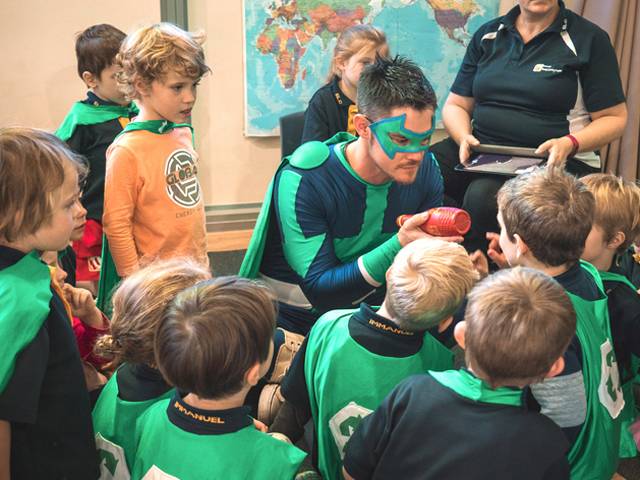Recycleman Sustainability Interview

Recycleman Teaching Children the Importance of Being Sustainable
It is reported that the average Australian produces 1.5 tonnes of waste per year, with much of this household waste being avoidable - such as plastic packaging and food waste.
Someone who believes in the importance of waste management is David Butcher - aka Recycleman. David is passionate about educating the next generation about recycling and has developed the Recycleman Show to teach children the importance of environmental awareness and sustainability through use of song, costumes, games and visual aids.
The Recycleman Show will appear at Australia's largest sustainability expo - Eco Expo - where he will continue to encourage parents and their children to recycle at home.
Interview with Recycleman (David Butcher)
Question: What inspired you to create the character of Recycleman?
David Butcher: I was previously the coordinator for a children soccer company, where I was teaching over 300 different children each week, so gained and immense amount of experience in entertaining and encouraging children. Around the same time the NQS (National Quality Standard) changed, to incorporate sustainability in its assessments of child care centres. Knowing the challenge this placed on child care services and understanding how important environmental awareness is in a child's early development, I realised that a children's environmental show is a great way to have a positive environmental impact. That's how Recycleman came about.
Question: When did your passion for recycling education begin?
David Butcher: It grew from understanding that by a child is roughly 5 or 6 years old, they have acquired about 80% of their personality and intellect. This really blew me away. I always wondered, if we could really focus on children and better establish an understanding between them and their connection to the planet, what would the ripple effect have on them when they are governing our country and running multi-million dollar business'. This is what motivates me so much to give 100% in every show, as I know that in just those 45 minutes, I may leave an impression on them that can literally last a lifetime - just like my kindergarten teacher.
Question: How do you suggest children take this information home, to their parents?
David Butcher: This is a great question and something that we are going to be working on developing in the Recycleman Show in the future. I believe that the best way a child can take this home is to first reach out to the parents and get them prepared for how excited their child is going to be when their child comes home after a show. If we can do this effectively, then parents will better be able to foster new recycling procedures in their homes, and most importantly continue to encourage this new energy their child has and reinforce this behaviour.
Question: What are the basics around home recycling?
David Butcher: The basic are incredibly simple - paper, cardboard, plastics, glass and tin cans. There are numerous little tricks that make the final process so much more simpler, such as cleaning out the jars and tins or knowing how soiled a pizza box is and whether it should or shouldn't be recycled, or understanding the difference with soft and hard plastic and what to do with both. The best bet is to go onto your council's website and find out what can and cannot be recycled as there is different process' for each council. Ipswich City Council for example do not allow glass to be recycled and residents are required to take it to the depot themselves for processing.
Question: How can we reduce our household waste?
David Butcher: Household waste is important and the first step I would encourage is to make a compost pile or worm farm to eat through all your kitchen scraps, it's a fun process and children love worms! Instead of just throwing out your kitchen scraps, they can be used to help fertilise the soil in your compost or feed your worms. Both of these avenues will help in and around the garden at home, and bringing a child closer to the environment is really what is going to have a huge effect on the planet in 50 years' time. Finally, the greatest impact a person can have on the planet is to start eating lots more vegetarian foods at home. You don't have to quit meat, I don't, but vegetarian foods are delicious and when you understand how much of an energy sink animal agriculture is for the planet, it's quite a no brainer.
Question: Can you share your top tips for parents?
David Butcher: First, show that Recycling is important for you - children tend to replicate what their parents do, so when your child watches you look for the recycling symbols on bins at home, they are most likely to absorb that interest in behaviour. You are the biggest influence on your child after all, so show them that you are adequately using your recycling system at home.
Create a simple recycling system / area in your house that is always accessible - keeping a box under the sink, or outside the house can make it hard for children to access your home recycling system. By keeping your recycling system in an a safe and easy place for them to access, this will allow them to remain focused on recycling and be reminded to do so.
Encourage with every action - even if your child mixes it up or gets it wrong, still remember to encourage and congratulate them for using the recycling station in the first place. It may take some time, so be patient, as it will be worth it.
Make your recycling station more visually appealing - get some old magazines that you may having lying around and cut out some items (paper, cardboard, plastics, tin cans and glass) that go into the recycling bin and glue them on to your recycling system. Having your child help with this process will give them a greater sense of responsibility as it's something that they have created with you.
Interview by Brooke Hunter
MORE





